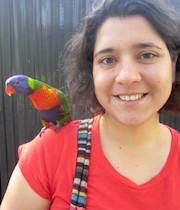Florencia Camus

Contact
Research interests
Biographical sketch
Publications
2016 -
2012 - 2016
2011
2007 - 2010
Marie Skłodowska-Curie Research Fellow, UCL
PhD in Evolutionary Biology and Genetics Monash University, Melbourne, Australia
1st Class Honours in Genetics
Monash University, Melbourne, Australia
Bachelor of Science, Dual Majors in Genetics and Evolutionary Biology
University of Queensland, Brisbane, Australia
Email: f.camus at ucl.ac.uk,
Phone: +44-20-76792674
Personal website here
Role of diet on sex-specific reproduction: “what you want is not always what you need”
Males and females perform different reproductive roles and have adapted to these by evolving sometimes strikingly different phenotypes. A key means to observe and understand differences is to examine metabolism, with studies being able to link differences in diet composition to varying levels of phenotypes. In spite of the clear dimorphism observed across the animal kingdom, both sexes are locked into a struggle over adaptation, rooted in the fact that both sexes share an almost identical genome. I am interested in identifying the dietary optimum for both males/females in Drosophila melanogaster, and seeing if this dietary optimum is actually what males and females prefer when given a choice. I am also interested in identifying possible candidate genes that are involved in the diet decision-making.
Mitochondrial genome evolution
I am also interested in how natural forces shape the evolution of the mitochondrial genome. The mitochondria are essential for life in eukaryotes, taking centre-stage in the process of cellular respiration. This process is regulated via a series of finely coordinated interactions encoded by two obligate genomes – nuclear and mitochondrial. Both genomes are required for the production of cellular energy, and thus their harmonious interaction is vital for the maintenance of mitochondrial integrity and the viability of eukaryote life. Recently, many studies have shown an abundance of phenotype-changing genetic variation segregating within the mtDNA genome – and these results run counter to the traditional paradigm in which mitochondrial genetic variation was expected to be evolving neutrally. It remains unclear how this variation is accumulating – either adaptively under selection, or non-adaptively under mutation-selection balance. Furthermore, maternal inheritance of the mitochondrial genome predisposes this genome to accumulation of mutations that have male biased effect, and the existence of these male-harming mutations has recently been empirically substantiated.
M. F. Camus, M. Reuter and K. Fowler. Dietary choices are influenced by genotype, mating status and sex in Drosophila melanogaster. Ecology and Evolution, in press.
M. F. Camus, K. Fowler, M. W. D. Piper and M. Reuter (2017) Sex- and genotype-effects on nutrient-dependent fitness landscapes in Drosophila melanogaster. Proccedings of the Royal Society B 284:20172237.
J.N. Wolff, N. Pichaud, M.F. Camus, G. Côté, P.U. Blier ,D.K. Dowling (2016). Evolutionary implications of mitochondrial genetic variation: mitochondrial genetic effects on OXPHOS respiration and mitochondrial quantity change with age and sex in fruit flies. Journal of Evolutionary Biology 29:736-747.
J.N Wolff*, M.F. Camus*, D.J. Clancy, D.K. Dowling (2015). Complete mitochondrial genome sequences of thirteen globally sourced strains of fruit fly (Drosophila melanogaster) that form a powerful model in mitochondrial research. Mitochondrial DNA 1-3. (* equal contributions)
M.F. Camus, J.B.W. Wolf, E.H. Morrow, D.K. Dowling (2015). Single nucleotides in the mtDNA modify mitochondrial function and are associated with sex-specific effects on fertility and ageing. Current Biology 25(20):2717-2722.
M.F. Camus, D.J. Clancy, D.K. Dowling (2012). Mitochondria, maternal inheritance, and male ageing. Current Biology 22(18):1717-1721.
